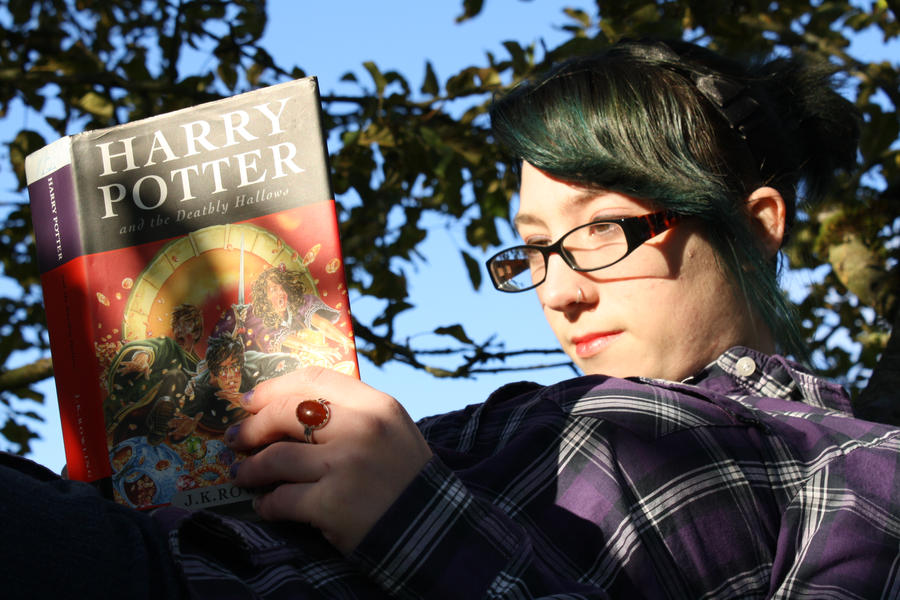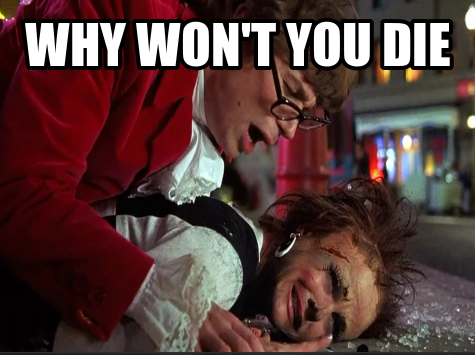this one's going to be pretty personal. I'll be keeping my normal 'funny' tone, but I'm not leaving any of this story out. I want this particular article to be helpful to people, and to do that, I need to keep it honest.
When I was sixteen, I became obsessed with the idea of what I'll clumsily call forgiveness. I started to engage in endless loops of "positive" thoughts to negate what I believed were negative ones. As just one of countless examples, I would repeat to myself (in my head) that I hadn't sold my soul to the devil. Why would anyone need to think that? Because when I was very young, I'd written out a contract (probably in crayon) saying I would. I did it because I saw Homer Simpson do it in Treehouse of Horror IV, for a donut. Most people probably can shrug that sort of thing off as childhood shenanigans, and forget it ever happened.
Not me.
I obsessed over it and everything like it that I could remember from my past. From silly stuff like that, to real things I had done every now and then as a child, that I now realized were kind of mean or selfish. I couldn't begin to tell you what brought on this "pattern" of thinking, as it's not the sort of thing I was ordinarily afflicted with. Despite the fact that I was feeling constant guilt, I can tell you in all honesty that I was a well behaved child and teenager, maintained good grades, was never outright mean, and never got into trouble. To the point that my parents actually "wished" I would get into more trouble, if it meant I was doing something. Like Smalls from
The Sandlot. But I was a bit of an arrogant smart-alleck too, and engaged in all of the little misdeeds a young person is wont to do.
 |
| Like watching the 66 best horror flicks I've never seen |
I began to confess every little thing I'd ever done to everyone, and also approached people for forgiveness who I'd felt I'd wronged, going all the way back to elementary school. I would approach them, and ask if they remembered "that one time" I made fun of them, lied to them, and stuff like that, hoping that I would eventually find "the one" thing that was making me feel this way. I began to seek out religion once I ran out of people to apologize to, because I still felt lousy, and I didn't know what else to do. So I began going to church (I'm Catholic by birth but was raised "nothing"). This helped in small doses, to the point where I went on a weekend retreat with the church's youth group, and actually had a pretty meaningful time there. I came back feeling as good as I ever had, like I'd found a huge dose of relief. But for some reason the "thought loop" was still there.
The repetition of thoughts turned to a sacrilegious nature (general curses against God), before I ever started going to church, but they continued to worsen even after the retreat. The thoughts were no longer as simple as "I don't like" this thing or that thing. Instead, it felt like each and every thought was making God (or whatever) increasingly angry at me, because he was always listening. To be clear (so that nobody gets the wrong idea), I want to repeat that this happened
before I ever started going to church. Religion isn't what "screwed me up". More on this part later because it changes to a more positive tone, but we have to tell the rest of the story to get there.
I continued to obsess over whether every little thing I said, thought, and did was ethical. To the point where it was no longer a matter of dealing with these negative thoughts as they came up. Months of this turned into years, and the thought loop became self-sustaining. Whatever thought I was hoping to keep out of my head was exactly what would pop into it. It was something I kept to myself for a very long time, walking around and going about my business, and battling it at the same time. My brain was divided into this thought loop, and all of the other stuff I was responsible for as a growing young adult. I was exhausted all of the time from fighting it. A coping mechanism I developed over time was that I'd avoid doing things. I would have an "unacceptable" thought, and try to fix it with behaviors; usually giving something up. Anything from stepping on a white tile instead of a black tile, to not eating the last bite of a meal. From there it went to everything. Anything. No fabric softener in my laundry today. No undershirt today. Stop playing that video game right now, before you reach the next save point. Do not use the word "very" in a sentence today. Find a synonym. The problem grew, and grew, and consumed my life.
 |
| Like a good book, except it's the most awful thing ever |
Sometimes I would get "stuck". That is, my coping mechanism of avoidance met the wall of responsibility. I'd very seriously decide to not do something (for this one example, we'll say shopping at Target within the day) and that would seem to calm me down. But then I'd find out my mom would need me to go to Target with her, to help with the groceries. Instances like these put me in a huge bind. I would scramble for something else to do, if I couldn't duck out of going. Change my socks, change my shirt, or whatever. Anything that my twisted sensibilities could live with. This was when I began to recognize this ...
thing as obsessive compulsive disorder, based on what I understood about OCD. But still I carried on with my life. If age 16 was the genesis of this, then I've been living with it for about 12 years now. At no point during this time did I ever seek psychiatric help, and only ever told a few people about it. I lived with it through my last 2 years of high school, my 3 years of junior college, 3 years of university, and the first 3-4 years of my "working" life. I'm 28 at the time of writing, and recently hit a wall. The story continues, but first, let's talk about OCD a bit.
See, a person with OCD usually recognizes that what they're thinking is not rational, but understanding this fact doesn't relieve them from it
at all. You have to perform your compulsions, while simultaneously knowing it makes absolutely no sense. That's a special kind of torture. The classic example symptom is washing your hands over and over (I never developed this particular symptom). It's accurate in most ways, but what most movies and TV won't tell you, is that the compulsion is usually the person's way of preventing bad things from happening. They isolate general fears into something they can control, in an effort to protect themselves. Often times the line of logic is "If I don't wash my hands, someone in my family might fall gravely ill. I
have to keep doing this, because it's right". I can't speak for everyone in the same position, but I was usually expecting God, the universe, poetic justice, irony, or whatever, to act on what I was thinking. Retaliate, so to speak. That is, the
one time I don't perform some kind of coping action is the one that'll be the last straw, and something awful happens. Most of you have experienced a thought pattern like this before. Have you ever held on to a sales receipt, just in case? Because you're afraid this is going to be
the one you need, even though
none of your stuff has ever broken within the return period? It's like that. Just intensify it by 100x. Then throw in the kind of guilt that comes from murdering someone with your thoughts. I was never dangerous to myself or anyone else, but in my head, every little thing I did held a real life-threatening consequence, and came with the corresponding guilt, frustration, shame, and anger.
 |
| Aunt Cheryl's life depends on this! |
Dealing with that kind of stress takes a toll on you, to say the very least. For a while I actually prided myself on being able to "take it" for so long. But 2 months ago, it finally got to a point where I couldn't live with it. The dual-life exhaustion I felt in college continued to eat at me. When I would hit walls like described above, I could usually retreat into avoidant behavior. But jumping through those hoops stopped working for some reason. I think I just became exhausted to the point of not being able to stay "one step ahead" of myself anymore. I reached my limit around the time my (maternal) grandfather fell ill. He was sick for months and months, until finally passing away. It was an awful situation for the whole family, especially my mother and her siblings, who cared for him 24/7. He lived in my parents' house, unable to leave his bed as he slowly declined. It affected all of us emotionally and psychologically.
Like I said, to deal with OCD the way I did, you need to be on your game, and ready to "dodge" anything. I was already nearing a tipping point before any of this happened. Push came to shove, and the issue built up like water at a dam, finally overflowing. I had what I can only refer to as a crisis. I was at work one day and just got ... blocked. The thoughts were happening like they always did, creating a list of "things I wanted to do today but can't now". That day, my workarounds had just stopped being enough. I couldn't complete any of my daily tasks without believing, honest-to-goodness, that some vague, awful thing was going to happen as a result.
 |
| This -- This was life for me |
I did the only thing I could think to do: I ran. I ran outside and immediately called a counselor I'd met at that church retreat, whose number (by chance) I hadn't deleted. She knew I was in crisis mode, and gave me the directions to a mental health clinic. I took the day off, and immediately made an appointment with a therapist. The day off became an unexpected 2 week vacation, which became an unexpected 2 month leave of absence. I live on my own (with roommates), but immediately shacked up with my parents for a few weeks while we figured it out, and waited for my appointment(s) to come. That was why the initial 2 week vacation happened. It was awful. I lived with this issue at it's most "red hot" for a couple of days, completely alone in my parents' house (they both work). Getting dressed in the morning was a problem. Walking to the kitchen for breakfast was a problem. Sitting down was a problem. I was locked down in just about every way possible. It's a terrible feeling, to be a free man in prison, so to speak. I am lucky enough to live in good health, in a time and place where I could conceivably walk out the door and do anything I want. But I couldn't. I couldn't do
anything, except hope that getting treatment really would help.
I was skeptical about getting help at first. In my head, the problem was ethical, not clinical. That is, the sacrilegious thought loop was something I created, and was responsible for. Any consequences of it were my fault, and my fault only. If there really is an afterlife, then keeping myself in good standing with God is way more important than living the next 40-50 years comfortably. When it came to therapy specifically, I also thought little good would come from just
talking about my feelings. Not to mention the drugs that would likely be involved, which could turn me into a zombie. On a less significant note, I also have a very sharp wit (or tell myself that) and didn't want to lose it. I have some artistic outlets and didn't want to lose my fuel for them. Lots of what I do, and even pride myself on, came from being in constant pain. I draw, write, and so on because there's some level of frustration present in me.
 |
| It Fuels My Genius!! |
But I was out of options; I flat-out could not take it anymore. I met with the therapist, and explained this issue to her in the best terms I could. This is harder to do than you might think. Try standing in the middle of a tornado, and trying to explain to someone via cellphone what it "looks like". I'm okay with words, though, so it went well. She referred me to a psychiatrist, which was also my first exposure how mental health care procedure works. A therapist is generally limited to talking with you about your issues and helping you work through them. For a proper clinical diagnosis, as well as the getting your hands on any meds, you need a psychiatrist. I didn't know that. This took another week of simply waiting around at my parents' house doing nothing, while it felt like my world was collapsing. I still couldn't perform the simplest of tasks, was not sure if I'd be allowed to keep my job (like I said, weeks turned into months), and had no idea where my life would be going from here. I had no idea if I'd ever be able to function in society again. There was a while where I had very real fears of having to be committed, becoming a "crazy homeless person", or moving back in with my parents and becoming a shut-in. Once I was able to see him, the psychiatrist diagnosed me with general anxiety disorder and obsessive compulsive personality disorder. He has a short list of other related disorders that I probably have, but according to him, they all fall under the anxiety umbrella.
I've been taking the prescribed meds and going to therapy now for about 2 months and I gotta say ... It's working. I'm currently on an antidepressant (
Prozac to be exact). I never considered myself depressed proper, but over the years I had done some research, and knew that antidepressants are usually prescribed for OCD. I was expecting that. But he also gave me a supply of an anti-anxiety med called
Klonopin, which he described as "beer in a pill". I'm guessing it activates the same relaxation area of the brain that alcohol does, but without any of the other effects. I don't walk around feeling drunk or anything. The Klonopin is just taken as needed to relax me; the Prozac is the primary drug in my treatment. He has to prescribe the Prozac incrementally, because you can't just start at 100% of the textbook-recommended dosage. They needed to make sure it worked properly before going all-in. It did bother me to be out of work for so long while the dosage slowly went up, but I get why they had to do it that way. Antidepressants are slow to act, and I had to wait a week or two for each (small) increase. [Update: As of October 2015, we're at the tail end of this phase. I'm currently up to 60mg a day, and the textbooks recommend 60mg to 100mg] As the dosage increases, I do feel better and better, and the thought loop feels like it's being broken apart and slowly fading away. Like the part of my brain where this thought loop resided is being "silenced" and I'm finally left with my natural brain. The one I had before I turned it into a tool of self-degradation.
 |
| It wasn't the best, but I'll take it |
See, back when I was a teenager, I had this general feeling of what I only-now have the perspective to call anxiety. As far back as I can remember, it's an issue I've had. I'd always had general fears of moving from one school grade to the next, for instance. I was timid by nature, and was afraid to do a lot of things most people don't think twice on. We're talking simple stuff like asking a store clerk for help. My guess is growing up was starting to pack on more and more responsibilities, which exacerbated it to a tipping point, and I've been on a downward slope ever since. I considered my brain my most useful asset, and tried to use that to understand what was happening. I delved deep (we're talking deeeeeep) into my own brain to try and figure out
why I felt this way. And I dare say that's when it became the real issue that I've had for so long. I began to create and cultivate a part of my brain, dedicated to figuring it out. I distinctly remember, at several points, having the option to stop thinking about it, but choosing to dig deeper and deeper into my own consciousness, to use brain cells I seldom ever used, to try and fix the problem. That's how I dealt (and deal) with problems. I think and think, until I find a solution. That was
really stupid.
See, in addition to a general feeling of anxiety, I also had a habit of assigning guilt to myself. This was mostly an egocentrism thing, like how kids often believe something is their fault, when it isn't. These two "quirks" combined led me to believe that I was nervous and/or guilty all the time, because I'd done something wrong or was simply a bad person. So naturally, I tried to correct it to make myself feel better. All the apologizing I did back in high school suddenly makes sense, but at the time it only helped in small amounts. I would apologize to someone, and feel better for maybe a day before I came back around. So then I went with the religious approach. It began with prayer, which would also only help me feel better for short bursts. But that's because I was probably doing it wrong; it was less prayer, more
CYA. I started attending church as I stated, and also went on that retreat when I was 18 --
That actually did give me some enlightenment. For the first time since it had started, I felt forgiveness that felt legit. But joining a religion proper was never something I had intended to do. So I was a bit lost on "what to do now". I felt good, but I think by that point the "damage" was already done; the thought loop had already been created a couple of years prior, and was there to stay. I continued with life as usual (since I had a college degree, life, and finding a job to worry about). It took almost 10 years, but the loop continued to eat at me, and I was back to the same level of misery as I was in high school.

Because that part of it was probably chemical. That retreat did help me in a very real and meaningful way. In fact I would never steer anyone away from religion or spirituality, because to anyone, they are amazing things to pursue. I recommend them in a very serious way, and hope to move back in that direction myself, once the "dust has settled". But I'm going to throw this out there as a possibility: just like you can't pray "the gay" away, you probably also can't pray away a chemical imbalance. I'm also coming to the realization that God likely doesn't blame people for having one. It's just that at the time, in my own self-created torture chamber, I couldn't realize that.
So we've told the story, but now we're getting to "the point". Today, things are good. But I know there are millions out there who are dealing with something like this. Maybe not OCD, maybe not anxiety, but something mental health-related. When you have a problem like this, no matter how hard you think about it, try and cope, and whatnot, you can't get rid of it. If your place of worship (if you have one), family and so on are supportive but something just still feels "wrong", you need to look into clinical help. If you have health insurance (I think it's a law now, right?), look into what options they offer for mental health. Don't have insurance? Reach out to someone who can help you find an option you can afford. They do exist. Your physician, at the very least, should be able to point you in the right direction. You can't fight something like this alone. Still can't do it? Fine; I'll get you started:
https://therapists.psychologytoday.com/rms/
http://locator.apa.org/
I think most would agree with me if I said there's a stigma surrounding mental health issues, currently. I had my own prejudices against getting therapy, like many of you might. Including but not limited to:
*not wanting to be labelled "crazy"
*general shame about it
*not believing it will help
*not wanting to be on meds
*not wanting to have to explain it to anyone who finds out
*not wanting anyone to find out, period
*believing you can handle it yourself
*not wanting to affect your "record" (background checks and such)
*thinking you'll "scare away" your family, friends, and everyone else
Lots of times, as a joke, if you have a comment that comes off as whiny, off-color, or even just disagrees with someone, that person will tell you that "you need therapy" or "you're crazy". They don't mean it literally, or to be mean, but it's phrased in such a way that it implies that having a mental health issue is ... I don't know. I'll clumsily say "gross". Like how lots of people (myself admittedly included) will call each other "gay" as a put down. People use the word "crazy" the same way. Either way, it's meant to create shame or embarrassment. This is a stigma that's gotta go.
ASAP. Shame and embarrassment should not be keeping people from getting the help they desperately need. I spent 12 [expletive] years dealing with this problem -- that's way way
way too long. 12 years of unnecessary pain, countless missed opportunities, and more than a few tests of the patience of my family and friends. I missed out on a ton of amazing things you're supposed to have in young adulthood, and I'll never get those chances back. If you have a problem, don't wait like I did. Get help
now. It's not (always) like a physical illness, where people can clearly see something is wrong, and will ask you why you haven't seen a doctor yet. You have to be the one to tell someone, call that number, or stand up and walk down to the office.
On a side note, you should also get some exercise. It went a
long way in helping me. Years before I got therapy, the symptoms of it were dramatically decreased when I took up regular exercise habits, and when I took a pause, the issue went back on the rise. I think I also stopped drawing around the same time, incidentally. So yeah -- get up off your butt and go for a jog. Join a health club if knowing you're paying for it motivates you to go. Do what you have to to make it happen. You know your habits and what excuses you make better than anyone else does; work around them. Make sure the workout is in your range of do-ability (whatever it is), but make sure you build up a good sweat. A real one; this will release endorphins, which are crucial.
I'm not back to 100% just yet, but we're very, very close. And that's why I want to write this. If even a single person comes upon this accidentally and finds the last push they need to get some truly needed help, then I'll write it. Do it for yourself, and for your family, and for your friends. But mostly yourself. You live once, and you can
not spend it in misery. It's a gross misuse of the gift of life. I also want to help de-stigmatize mental illnesses. I don't know how I plan on doing that, but writing this and getting it under as many pairs of eyes as possible is a start. If you found this article meaningful, I ask that you please share it.
For the first time in a long time, I don't just see an amorphous blob of self-created obstacles when I think about the future. I'm still the same , critical, "strange little creature" that I've always known myself to be, and loved being. The meds and therapy haven't changed that. I always fancied myself a poor man's Dr. House, and still do. But that black rain cloud that lived inside my brain? It's breaking up. I've never liked bright, sunny days; I'm a rain person. But today ... I can deal.
Happy 4th.





.jpg)














